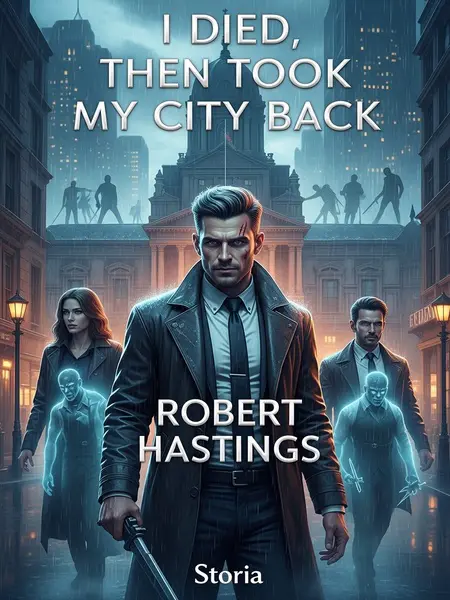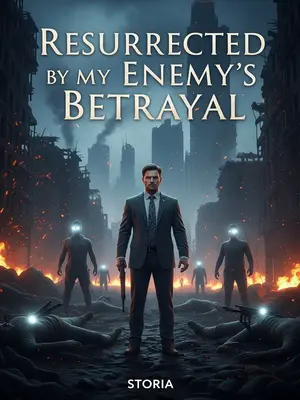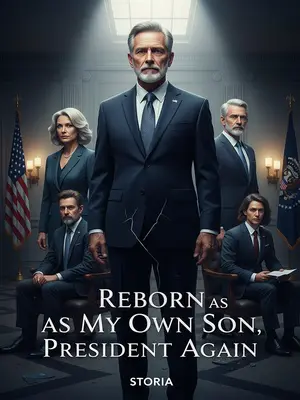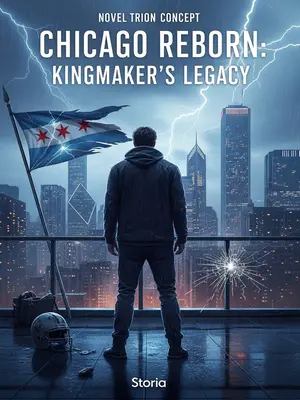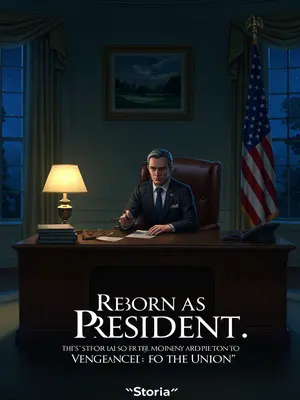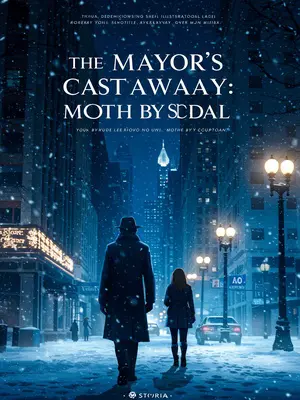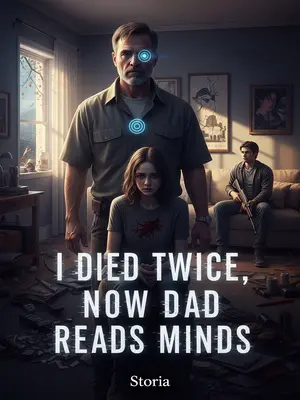Chapter 1: The Mayor Rises From the Grave
Robert Hastings died in battle, defeated while trying to avenge his closest friends. In Silver Hollow, as the city officials and military aides mourned, he suddenly gasped—came back to life.
A hush fell over the room. You could hear the old grandfather clock ticking in the hallway. Nobody dared breathe. One heartbeat, then another, and then a collective gasp as Robert’s chest rose and fell, life flooding back into him like a river surging after a spring thaw. People clutched at each other, jaws slack, unable to believe their eyes.
Even as he drew breath, his body began to change—growing younger, muscles tightening, skin smoothing. It was as if the years rolled backward right there in front of them.
His hair, once streaked with gray, now shone a deep chestnut brown. The lines of age melted away from his face, and his hands—calloused but steady—were those of a man in his prime. The change rippled through the room like a ghost passing through. Someone dropped a glass, and it shattered on the wood floor. The sound was sharp as a gunshot. For a moment, no one moved.
Somebody whispered, “It’s a miracle.” Others just stared, too stunned to speak.
One of the city clerks crossed himself, muttering, “Lord, have mercy.” Another, eyes wide, whispered, “I swear, if I hadn’t seen it myself…” The room buzzed with an energy that was equal parts awe and fear, as if the ground beneath their feet had just shifted.
Robert said, “If I can come back to life, then who can stop me from avenging my friends, or from reviving the dream of restoring justice and unity to this country!”
His voice rang out, strong and sure, echoing off the high ceilings of Maple Heights Mansion. He sat up, met every eye in the room, and for a moment, even the most cynical of his aides felt hope flicker in their chests. Later, people would say it was just like the old stories—the kind about heroes who refused to stay down, no matter how many times the world tried to bury them.
That March, the grass grew tall, robins flitted through Silver Hollow. But nothing could cover the grief blanketing Maple Heights Mansion—not even the promise of spring.
Spring was in the air, but the halls of the mansion felt like the dead of winter. The scent of fresh-cut grass drifted in through the open windows, but it did nothing to chase away the heaviness that hung over the place. Even the robins seemed to sing more softly, their melodies muffled by sorrow.
Robert lay on the bed, half-dead, and the memory of his old home in Riverbend floated before his eyes. Gabriel was there, raising a glass, his sharp eyes shining, vowing to share both hardship and joy with his friend, swearing never to break his word.
The memory came back in flashes: the flicker of lantern light on Gabriel’s face, the clink of glasses, the smell of whiskey and woodsmoke. Gabriel’s voice was always steady, always certain—a man you could trust with your life. The words he spoke hung in the air, sacred as any oath.
Frank was beside him, gulping down bourbon, then grabbed a pen and scrawled: “Never abandon, live and die together.”
Frank’s laughter was big and rough, the kind that filled the whole room and made the walls shake. He’d always had a way of making even the darkest night seem a little brighter, a little less lonely. The words he wrote were crooked, but the sentiment behind them was as true as anything Robert had ever known.
After writing, he let out a hearty laugh.
The sound echoed in Robert’s mind, mingling with the warmth of the fire and the easy camaraderie of old friends. For a moment, it felt like nothing bad could ever touch them, like the world outside that little room didn’t exist.
The laughter in Riverbend faded away, and then the fire raging in Elmwood swept over, burning the memory away, bit by bit. Robert felt his smile sink into a quagmire along with his thoughts, and every memory seemed to take twenty years to cross. Suddenly he remembered: so Gabriel and Frank were already dead.
The realization hit him like a punch to the gut. The fire in Elmwood—he could almost smell the smoke, hear the crackling timbers. It was as if every happy memory had been scorched, left blackened and hollow. Grief welled up inside him, heavy and old, a pain that never quite healed.
Crying sounded by his ear again.
The sound was raw, unguarded—grown men weeping without shame. It was a sound Robert had heard before, at funerals and on battlefields, but it never got any easier.
Robert turned his head and found John Young, Daniel Price, Charles Graham, and the others weeping.
John’s shoulders shook, Daniel covered his face with one trembling hand, and Charles, usually so composed, let the tears run down his cheeks unchecked. The sight of it all made Robert’s heart ache in a way that words couldn’t touch.
He felt it deep in his bones: now he was the one about to die.
The finality of it settled over him, cold and implacable. He felt the weight of unfinished business, of promises made and broken, pressing down on his chest.
Robert’s eyes went blank, and he said, “Charlie, oh Charlie.”
His voice was barely a whisper, rough with regret. He reached out, hand searching for something to hold onto—some anchor in the storm.
Charles replied, “I’m here.”
The words were simple, but the way Charles said them—steady, unwavering—was like a lifeline thrown to a drowning man.
“No more of that ‘servant’ stuff. From now on, my ambition is your ambition. Everything I have—it’s yours. You’re ten times the man Paul Pierce is. If Andy can be helped, help him; if not, take over yourself. Promise me, help me rebuild what we’ve lost.”
He spoke with a kind of desperate hope, willing his legacy into Charles’s hands. It wasn’t just about power or pride—it was about trust, about passing on the torch to someone who would carry it farther than he ever could.
Charles couldn’t hold back. Tears streamed down his face. He bowed his head, voice shaking as he swore to devote himself—no matter what, until the end.
His voice shook as he made the promise, but there was steel in it, too. The other men in the room felt it—a moment that would be talked about in Silver Hollow for years to come. The kind of vow that changes the course of things.
Robert, instead, laughed. He said, “You must not die, I don’t want to see you die again, you must live, you’d better stick around forever, you hear me?”
His laugh was rough, almost wild, but there was a tenderness underneath. He gripped Charles’s shoulder, squeezing hard, as if he could will him to live just by holding on tight enough.
The sound faded away. In Silver Hollow, at Maple Heights Mansion, starting with John Young, all the officials broke down sobbing. The wailing rose up, filling the halls.
The wailing was loud and unrestrained, echoing up the stairwells and out into the night. Some of the staff collapsed into each other’s arms, their grief raw and honest. The mansion, usually a place of order and dignity, was thrown into chaos by the force of their sorrow.
There was also an attendant standing by, eyes brimming with tears, shouting at the top of his lungs, “The Mayor has passed away…”
His voice cracked in the middle of the announcement, the words tumbling out in a jumble. The news swept through the mansion like a cold wind, freezing everyone in place.
The attendant hadn’t finished his sentence when his face turned pale, his jaw went slack, he bit his tongue, then his whole body trembled all over, and he collapsed to the ground on his butt. That look was hard to describe.
He looked like he’d seen the devil himself. His eyes were wide and wild, his mouth working soundlessly. The others stared at him, afraid to move, as if the world had just turned upside down.
Like he’d seen a ghost.
No one spoke, but the thought was on everyone’s face. The air was thick with fear and something else—wonder, maybe, or the beginnings of hope.
After the death of Mayor Hastings, the white in his hair faded to black, his beard dropped away, wrinkles vanished like ripples on water, and he became that young man in his twenties or thirties again.
It was as if time itself had reversed. The transformation was so complete that, for a moment, it seemed like the rules of the world no longer applied. Some of the older officials crossed themselves, others just stared, unable to make sense of what they were seeing.
Robert opened his eyes.
For a moment, he just lay there, blinking up at the ceiling, trying to piece together what had happened. The world felt strange, dreamlike, as if he were floating between two realities.
“Damn, I’m alive again.”
He sat up slowly, rubbing his forehead. The familiar ache in his joints was gone. He flexed his fingers, marveling at the strength in them. “Well, I’ll be damned,” he muttered, half to himself. “This is new.”
Maple Heights Mansion was silent. John Young blurted out, “Holy crap!” It echoed through Silver Hollow.
The exclamation broke the spell, and a ripple of nervous laughter followed. Someone in the back snorted, another clapped a hand over his mouth, and for a moment, the tension in the room eased just a little.
Robert blinked, a bit dazed.
He swung his legs over the side of the bed, feet finding the cool wood floor. His mind raced, trying to catch up with his body.
Who am I? Where am I? What am I supposed to do?
He squinted at the familiar faces, trying to place them. Everything felt both impossibly distant and painfully close. It was like waking up in someone else’s dream.
No rush, let me think. After I finished with that bastard Don Drake, then I went to Gus Nelson, fought Roy Sanders with Tim Keyes a few times…
He ticked off the memories in his head, one by one, like cards dealt out on a poker table. Each one was sharp, vivid, as if it had happened yesterday.
Got it! I should have just gotten the post of County Commissioner, time to uphold justice!
He grinned, the old fire sparking in his eyes. “County Commissioner Hastings,” he said under his breath, rolling the words around like a fine bourbon. “Has a nice ring to it.”
Where the hell is this?
He glanced around, trying to get his bearings. The high ceilings, the heavy drapes, the portraits of stern-faced ancestors on the walls. It was Maple Heights, sure enough—but it felt different, as if the house itself was holding its breath.
Who is that middle-aged scholar, tall and gaunt, with lines of hardship etched on his face, tears streaking his gray sideburns?
Robert squinted at the man kneeling by the bed. There was something familiar about him—a kind of quiet dignity, the way he held himself even in grief.
He’s kneeling there—why do I feel a little sorry for him?
The sight tugged at something deep inside Robert, a memory he couldn’t quite reach. He wanted to reach out, to offer comfort, but the words wouldn’t come.
Robert reached for his side, caught nothing.
